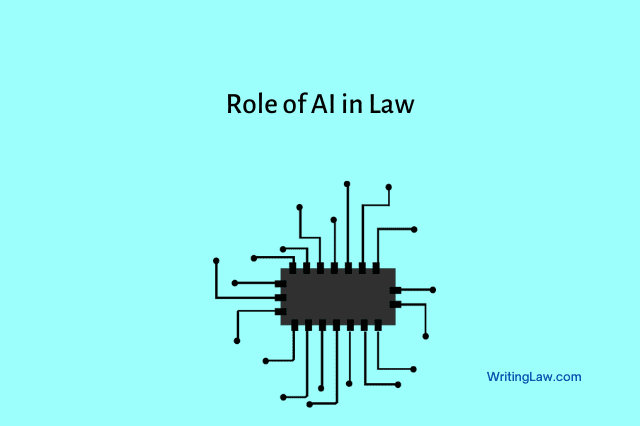
This article will enable you to understand the impact Artificial Intelligence holds in today’s legal education and profession.
Impact of AI in Everyday Life
A popular technology that makes navigating our personal and professional lives easier and more convenient is artificial intelligence (AI). Whether we realise it or not, AI has an impact on our daily life. Although the legal sector has historically resisted new technology, AI is starting to impact law firms significantly. By automating routine tasks like legal research and analysis, document management, and billing, AI in law practices may substantially increase productivity and reduce costs for organisations.
Advancement of AI to the Legal Industry
Artificial intelligence is advancing quickly, and this will have a big impact on the legal industry as well as a few different sectors of the law. AI has the potential to dramatically transform how lawyers work.
Machine learning is already being used in research and pilot projects to predict the results of court cases. AI is assisting lawyers by automating routine tasks like creating NDAs (Non-Disclosure Agreements) and other lower-exposure or lower-liability contracts. By leveraging data samples to identify pertinent documents in combination with e-discovery requests, AI is also helping in-house lawyers save time. AI can also assist in automating tasks and processes, such as finding and collecting clauses for analysis during transactional due diligence.
Must Read: How Is Artificial Intelligence (AI) Useful for the Legal Industry
Impact of AI in the Education and Job Sectors
Artificial intelligence has little impact on legal education, particularly in legal higher education, due to the human character of education, the complexity of legal information, or the conservatism of practitioners.
However, a study revealed that legal education must start integrating knowledge from technological fields and quantitative methodologies without ignoring the exercise of traditional normative skills and communicative and narrative values that are highly valued by law professionals, thus emphasising the need to foster student creativity. Several of the processes used by the legal sector already use AI.
Although artificial intelligence may not be readily apparent, it helps paralegals and solicitors perform their jobs more successfully and efficiently. As far as artificial intelligence helping solicitors, attorneys, and law students is concerned, everything is excellent and fair.
When AI replaces humans in a role, there is cause for concern. A new way of collaborative case processing between humans and computers can be created in the high-level application field where artificial intelligence for complicated settings can help or even replace some of the work done by legal professionals.
Recent News About Technological Intervention in Courts
You can understand the intervention of artificial intelligence in court hearings with these two prominent examples.
First Robot Lawyer
In a “historic” first, an AI-powered “robot lawyer” will represent a human in a US court, according to recent news reports. Instead of replying to each statement made in court, the AI will purportedly analyse the arguments presented there. It is obvious that there is not yet a high risk of AI replacing legal professionals, but universities must inform students that there are specific legal professional duties that AI tools could replace – to encourage them to concentrate on work that machines cannot replace
The DoNotPay programme will enable the robot lawyer to listen to court arguments in real-time and advise the defendant via an earbud on how to reply. DoNotPay is a downloadable smartphone application that functions as a “robot lawyer” by using artificial intelligence to offer legal services.
Columbian Court’s Virtual Hearing
On 24th February 2023, a Colombian court just conducted its first legal trial in the metaverse and plans to do so again soon. During the two-hour hearing held by Colombia’s Magdalena Administrative court, participants in a traffic disagreement appeared as avatars in a virtual courtroom. An image of Magistrate María Quinones Triana wearing black court attire was also observed during the virtual trial.
The nation is one of the first in the world to test actual court proceedings in immersive virtual reality, or the metaverse, which often includes avatars for each participant to make virtual places seem more realistic.
Can AI Replace the Legal Profession?
Several questions have surfaced, with the biggest one being: Can AI eventually replace the legal profession? It might be claimed that components of a lawyer’s job that need emotional intelligence and human judgement cannot yet be replicated by AI technology. Consequently, attorneys will always be more skilled at drafting agreements, interacting with clients, and mediating conflicts. But even though it is obvious that AI will have an impact on the legal industry, lawyers won’t go extinct.
Read Next:
1. What Are the Laws on Cyberstalking in India?
2. What Is Copyright Infringement and Its Remedies in India
3. Top 6 Major Flaws in the Current Indian Judicial System
- The Future of Intellectual Property Rights in a Digital-First World - 2nd May 2024
- Environmental Law and the Legal Response to Climate Change - 23rd April 2024
- Legal Challenges in Classifying Workers in the Gig Economy - 16th April 2024







